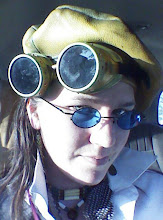In
1968 James T. Tiptree wrote Birth of a Saleman for Analog
Science Fiction. He corresponded with fans and others via letters,
never once speaking on the phone or meeting with people at conventions. His
life was private, and, many assumed his reasoning had everything to do
with keeping his writing separate from his everyday. Considering many
other writers of the time did the same, working another job on top of writing
and not wanting either to become entangled, it was a sound explanation. But, in
1976 James was outed during a slip when he revealed in a letter that his mother
had passed away."Inquiring
fan-sleuths identified the obituary—and its reference to an only
child, Alice Sheldon" (Techgnotic).
For female fan readers
everywhere this meant the feminist themes in James’ stories made more sense.
This also gave them reason to cheer when so many male fans of James’ writing,
writers and simply readers alike, all felt there was no way such writing could come
from a woman. Of the experience, Alice only had to say:
“I've had too many experiences in my life of being the first woman in some damned occupation.” (Sheldon via Techgnotic).
Many writers like Alice
have had similar reasons for choosing a pen name over the name they were given
at birth (or, several days later if their parents had a case of indecision).
For some, it really is a matter of keeping their identity hidden due to sexism.
J.K. Rowling was also one of these women; her publisher, Barry Cunningham,
thought that boys might be more likely to overlook the series if it was known a
woman wrote it. Thus, her name—Joanne—was remade. (The K stands for Kathleen—her
grandmother’s name.)
But it’s not just women.
In the romance genre it’s
almost entirely unheard of for a man to write, so if one did write for it he
too would likely choose a pen name that denoted him as female. Don’t believe
me? I cite Leigh Greenwood; to meet her in person you would call him Harold
Lowry. Much the same goes for Jennifer Wilde (Thomas Elmer Huff) and Jessica
Blair (Bill Spence).
But a name we with write
with—be it our name or one we’ve name up—isn’t just something that’s on the
book. It does represent you, doesn’t it? For a writer this can be more than a
matter of sexism, but also of genre. If you’ve established yourself an erotica
novelist and suddenly want to write YA adventure books, it can become a
problem. Do you take a different name, or take the chance of your established
audience shying away from this new project—either out of fear of it being bad,
or, because of disinterest in said genre?
It does pose other
problems as well if you’re an indy writer, or, a writer who depends heavily on
advertising via your own pocket. Do you make a new webpage for this
personality? Or, remake your own page to suit both sides of yourself?
Unlike the question of
sexism in writing and reading, the answer might not be so obvious. There isn’t
an easy solution. It really comes down to what your capable of, and, how
comfortable you are as a writer. If the genre you’ve established yourself in
isn’t too different from the new one you want to write in as well, then why not
use the same name instead of reinventing yourself? However, if you’re known as
a children’s writer and are thinking about writing erotica… it might be best to
pick a new name. (Or, if your a man writing in a female-predominated genre: a female name.) It does mean working from the ground up, but if it feels
better for you then the chances might be better served rebuilding a little.
Links/Sources:





